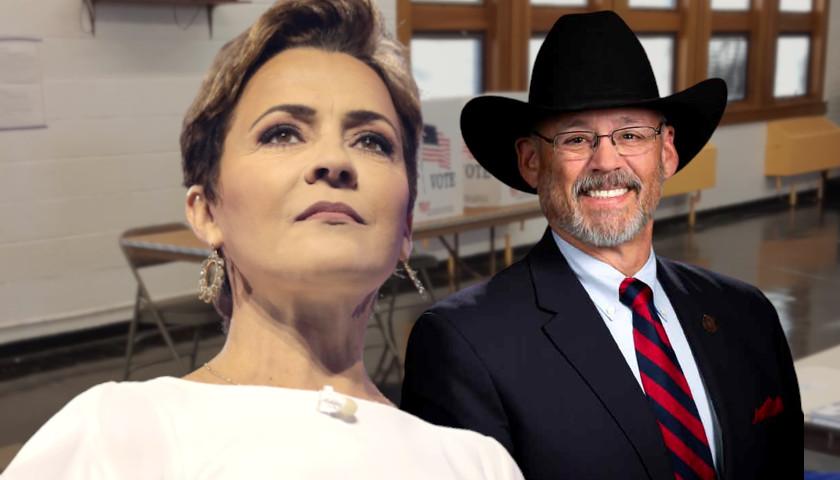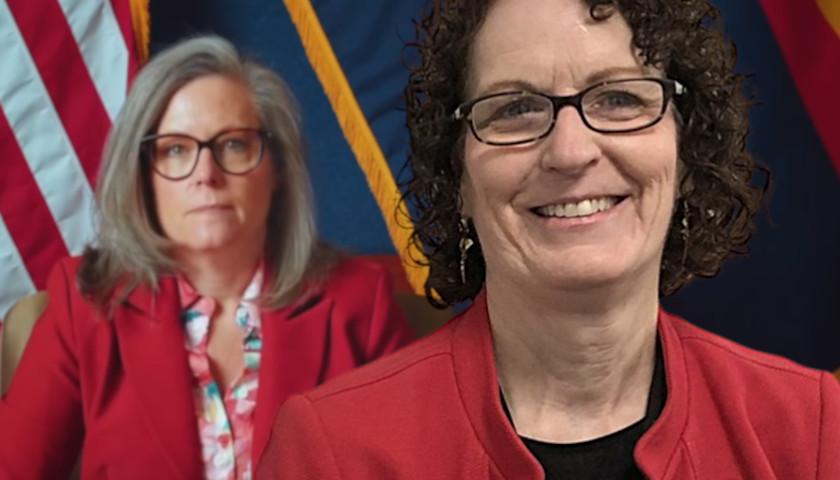by Natalia Mittelstadt
While Maricopa County released a report on the election failures of the 2022 elections, Arizona election lawsuits continue as 2022 GOP nominees Kari Lake and Mark Finchem file motions for reconsideration in their respective races for governor and secretary of state.
On Monday, Maricopa County released a report by former Arizona Supreme Court Chief Justice Ruth McGregor on the causes of the ballot printer issues that occurred at more than 70 vote centers on Election Day last year, which resulted in long lines as many voters’ ballots were unreadable by tabulator machines.
According to the report, the county expanded the length of the ballots from 19 inches during the primary election to 20 inches in the general election in order to include all of the required information. The increased ballot size in combination with the use of 100-pound ballot paper, the report concludes, was too great a strain on some older printers that were used.
Regarding the issue of ballots being printed for 19-inch paper rather than 20-inch, the report concluded that “ballots were re-sized as ‘fit to page,’ a process that entirely changed the location of the timing marks on the ballots and assured that neither the on-site tabulators nor the central count tabulators could read the ballots.”
It couldn’t be determined whether the reason for this change was “from a technician attempting to correct the printing issues … or a problem internal to the printers,” according to the report. However, during the investigators’ “testing, four printers randomly printed one or a few ‘fit to page’ ballots in the middle of printing a batch of ballots. None of the technical people with whom we spoke could explain how or why that error occurred.”
Maricopa County Board of Supervisors Chairman Clint Hickman said regarding the report, “now that we have a better idea of the factors involved, we’ll make changes to best serve voters, starting with replacing some equipment.”
These and other failures that marred the November election prompted Lake’s election lawsuit, which she originally filed in December.
Lake, the Arizona GOP gubernatorial nominee, fell about 17,000 votes short in the 2022 election. She is suing current Democratic Gov. Katie Hobbs, Secretary of State Adrian Fontes, and Maricopa County election officials and is requesting that the election results be invalidated or that she be declared the winner.
Lake’s case was reviewed by the Arizona Supreme Court, which remanded one of her seven counts to trial court and allowed sanctions against her to be considered.
Maricopa County Superior Court is supposed to rehear Lake’s count on Maricopa County’s alleged violations of its signature verification practices but is waiting on the high court to determine if she must pay sanctions to Hobbs and Fontes regarding her claim of 35,563 unaccounted early ballots being added to Maricopa County’s final tally.
On Wednesday, Lake’s lawyers filed her opposition to sanctions with the Arizona Supreme Court and a motion to reconsider hearing the count regarding the 35,563 unaccounted early ballots.
“We took the sanctions briefing ordered by the [Arizona Supreme Court] and flipped it into a request for reconsideration of the 35K ballot injection issue at Runbeck,” Lake told The Arizona Sun Times regarding the filing.
In Lake’s lawsuit, she had claimed there were 35,563 early ballots added to the total number of ballots scanned at Runbeck Election Services. However, the high court found that the “record does not reflect that 35,563 unaccounted ballots were added to the total count.”
In Lake’s new motion, her lawyers note that while “the number of early ballots recorded on the Runbeck Receipt of Delivery forms dated November 8-9, 2022, totaled 263,379 ballots,” there were “298,942 Election Day early ballots recorded on the Runbeck Scan Receipts, that is a discrepancy of 35,563 more ballots scanned than ballots received.”
Meanwhile, Finchem, a former Arizona state representative, filed a motion for reconsideration of his election lawsuit against Fontes on March 29. Finchem’s lawsuit requested the election results in his race be set aside and ballots be inspected to determine which votes were legal before determining the winner. Maricopa County Superior Court Judge Melissa Iyer Julian dismissed Finchem’s lawsuit in December and sanctioned him over his lawsuit, finding it “groundless and not brought in good faith.”
In Finchem’s new motion, he included an affidavit from Bob Hughes, an Arizona resident with “50 years of experience in the printing industry” at various companies and “16 years of experience printing ballots for Maricopa County Elections,” according to Hughes’ sworn declaration. Hughes also “helped establish the auditing criteria for the printing and paper portion of the 2020 Maricopa County ballot audit” by the Arizona state Senate.
On March 6, 2023, Hughes led a team that reviewed and copied “the Logic and Accuracy reports for the 2022” elections in Maricopa County, according to the affidavit. He “physically inspected the ballots at MCTEC that were used in the testing of the election tabulators … reviewed the certification reports for each Maricopa County Voting Center used in the 2022 Election” and reviewed “the Tabulator reports that are printed by the machines during their testing.”
Hughes noted that “every machine and every voting center report showed that every test was passed without any failures.”
According to Hughes’ affidavit, only 20-inch ballots for the November 2022 election were created at the Maricopa County Tabulation and Election Center (MCTEC). Since Maricopa County uses ballot-on-demand printers, after a voter checks in at a voting center on an e-poll book, the correct ballot style prepared at MCTEC for the voter in that precinct is sent to the printer.
“This indicates that it was not possible that a BALLOT STYLE other than a 20″ PDF could have been used, even by accident for the 2022 election,” Hughes wrote. “Yet, on Election Day a substantial number of wrong sized ballots were printed. This clearly indicates that the interference caused by 19″ ballots had to have been by someone from MCTEC or by someone hacking into the MCTEC system.”
Hughes found that the ballots printed on Election Day were “photographically reduced” and the possible ways that could occur are by: “A command changing the printer to ‘print to fit’ with a ½” top and bottom margins; A change in paper settings to 19″ paper resulting on a reduced image; [or] A change in the paper tray to smaller paper resulting in a reduced image.”
Hughes concluded: “An intentional change was made to the printers affecting the DAY OF Election ballots.”
Hughes told Just the News on Monday regarding McGregor’s report to Maricopa County: “The fact that she says these machines all failed the exact same way by reducing the size of the ballot” because the printers were working “so hard” that they “just independently decided” to have the same issues is “ridiculous.”
– – –
Natalia Mittelstadt is a reporter at Just the News. Mittelstadt graduated from Regent University with Bachelor of Arts degrees in Communication Studies and Government.
Photo “Kari Lake” by Gage Skidmore. CC BY-SA 2.0. Background Photo “Voting Booths” by Tim Evanson. CC BY-SA 2.0.








